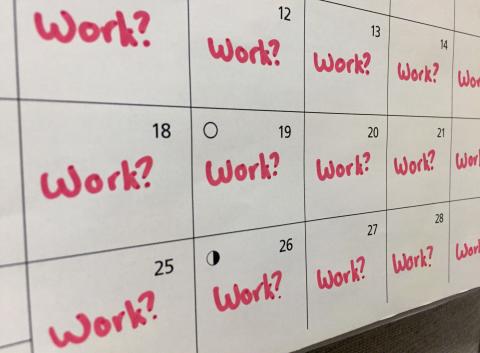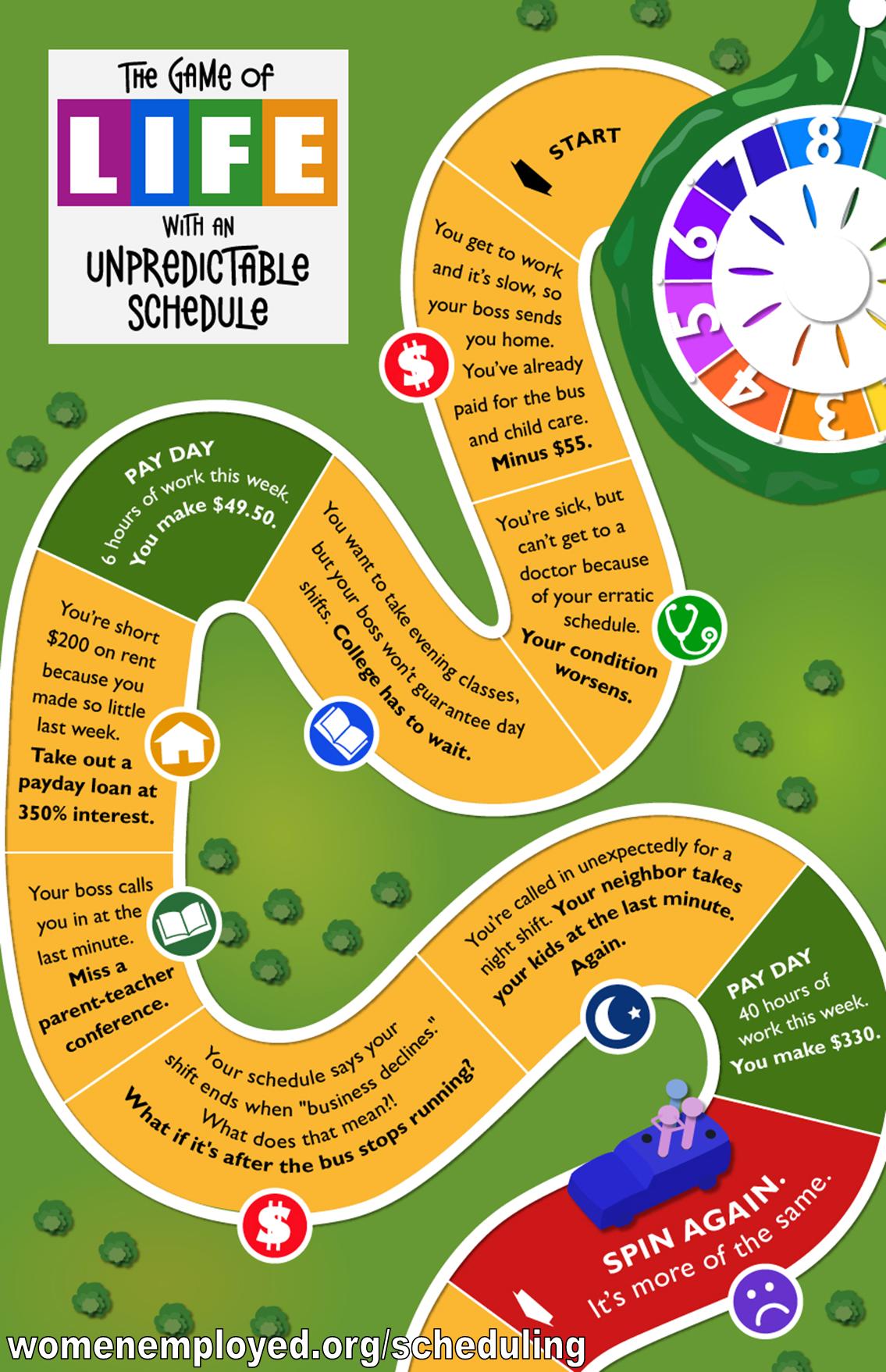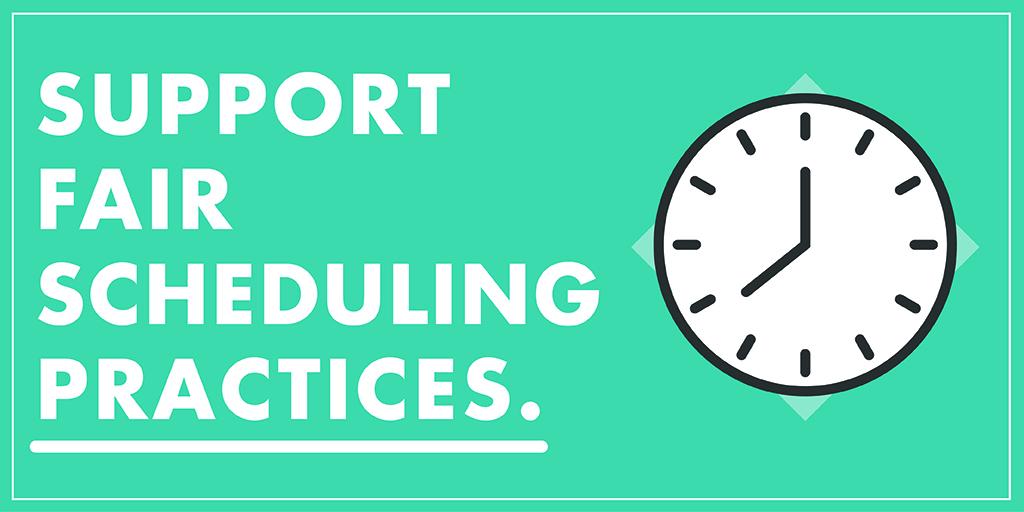
Life as a Parent with an Unstable Work Schedule
Google family calendar.
Outlook work calendar.
The calendar app that syncs my electronic calendars on my phone.
My 2016 annual planner.
The calendar that hangs on my kitchen wall.
These are the tools that I use every day (in the attempt) to keep my schedule organized. As a full-time working mother of four kids—a 6th grader, a 2nd grader, and two-year old twins—I have to maintain highly coordinated calendars with my husband Jason so we can manage our work and family schedules.
Fortunately, many of our scheduled commitments occur at the same time, same day, week to week: piano lessons, dance class, park district camp, childcare, and so on. We map out our schedules to fit together with the precision of a jigsaw puzzle, even though we know disruptions and opportunities will soon make a jumble of the pieces: dentist and doctor appointments, play dates, work travel, sick babysitters, flat tires, delayed trains, school closures for snow days and report card pickup....
So this is the point where I stop myself. And take a breath. And realize how lucky I am. If I were a low-paid working mother struggling to support my family by working a job in retail or food service, I would still need to deal with all the commitments, obligations, and opportunities that I rattled off above. But no Google calendar or paper planner could help me deal with the unpredictability of my work schedule.
Let's say I'm the primary breadwinner and I'm hired to work 25 hours per week.
- Women are the sole or primary breadwinners in 40 percent of families with children ages 18 or younger.
Knowing the job is part-time, I might plan to return to school or pick up a second job.
But when I decide to take night classes to earn my degree and get a better job to earn more and help support my family, my boss won't guarantee day shifts.
Business might be slow one day, and my boss might send me home—even though I've already paid for childcare and bus fare.
Come pay day, my paycheck might vary by a couple of hundred dollars because I was only able to work three full days, or I might only make $49.50 because my boss only scheduled me to work 6 hours this week, even though I was originally promised 25. Which could leave me short on rent.
- 17 percent of American workers suffer from erratic schedules.
Even if I'm able to get my full 25 hours each week, it's likely my schedule is only posted a couple days in advance. Which means I can't get a another job or take classes.
- A recent poll by Public Policy Polling showed that a shocking 43 percent of workers have potentially less than one week's advance notice of their hours.
On the morning of my daughter's parent-teacher conference, my boss might call me to come into work right away. I probably can't refuse, because that could jeopardize my job—and besides, I need the extra money. I have to tell my daughter I won't be able to make it.
- The Economic Policy Institute report on how unstable schedules affect workers' children: parents are less able to find quality, consistent child care arrangements, may lose eligibility for child care subsidies because their hours fluctuate, and are less able to engage in pre-academic activities with kids, such as reading books or practicing math skills.
...rinse and repeat.
This is what life looks like for far too many employees in low-paid jobs, and it isn't fair. We all want to be able to plan our lives and take care of our children. We all deserve to be able to sustain ourselves and our families while working, whether the job is in a restaurant or the corner office.
What's more, it doesn't have to be this way. Employees aren't the only ones who are hurt by unfair scheduling practices: unpredictable and unstable schedules are bad for business and society, too. When employee morale and loyalty are low, it leads to high turnover, and the costs of constantly hiring and training new employees are massive.
Successful businesses such as Costco and QuikTrip have shown that it's possible to be profitable while giving workers stable, predictable schedules. Ideally, businesses would do this on their own, but when they don't act, policymakers have to step in. We need laws that takes steps such as establishing a floor for minimum hours or requiring that employers provide show-up pay.
Want to learn more about the issue of unfair scheduling? Visit Women Employed's website. We're discussing and implementing fair scheduling solutions with partners, businesses, and policymakers—because all working parents should be able to plan their lives, support themselves, and take care of their children.






The views and opinions expressed in this post are those of the author(s) and do not necessarily reflect those of MomsRising.org.
MomsRising.org strongly encourages our readers to post comments in response to blog posts. We value diversity of opinions and perspectives. Our goals for this space are to be educational, thought-provoking, and respectful. So we actively moderate comments and we reserve the right to edit or remove comments that undermine these goals. Thanks!